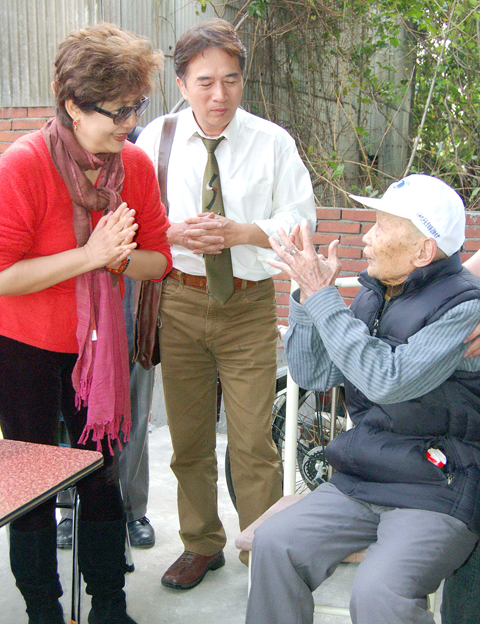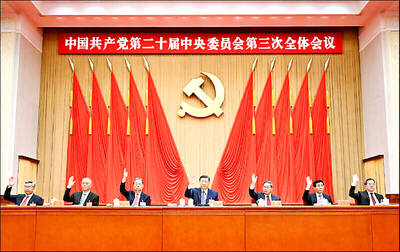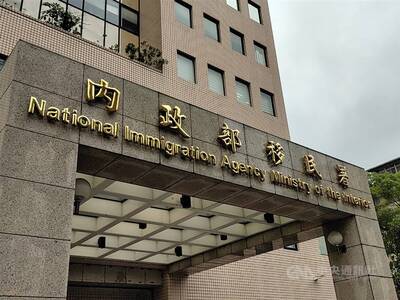Most people would think that an internment camp prisoner and a guard would be sworn enemies — but that's not the case for former prisoner Chao Shih-ping (趙世平) and her guard, Ko Ching-hsing (柯景星). In fact, Chao and her family spent 65 years searching for Ko to deliver a long-delayed “thank you.”
The family's wish was finally fulfilled when Chao's niece, the Houston-based psychologist May I-ting Lu (卓以定), flew across the Pacific Ocean to meet Ko on Thursday last week at his house in Homei Township (和美), Changhua County.
“Everyone in our family is full of gratitude [to Ko], because he saved the lives of my aunt and her two children,” Lu told the Taipei Times in a telephone interview. “My father, who had just passed away last year, would be so happy to see that we finally found Ko.”

PHOTO: TANG SHIH-MING, TAIPEI TIMES
The story began more than six decades ago in wartime Sarawak, a British colony at the time and now a state of Malaysia.
The Japanese invaded Sarawak at the end of 1941 and soon occupied it.
Serving as the Republic of China consul to Sarawak at the time, Lu's uncle — Cho Huan-lai (卓還來) — was arrested and put in prison the following year as he refused to collaborate with the Japanese. At the same time, Cho's wife — Chao — and their two children were also put in the Batu Lintang prisoner-of-war (POW) camp near the Sarawak capital, Kuching.
Along with civilians like Chao and her children, the Batu Lintang camp housed thousands of Allied POWs.
A group of young Taiwanese in their teens or early 20s was sent to Batu Lintang as guards to watch over the prisoners.
An editor at Taiwan Historica and a specialist in the history of Taiwanese serving in the Japanese military during World War II, Lee Chan-ping (李展平), said that as many as many as 200,000 Taiwanese men and women were sent to Southeast Asia and China to serve as soldiers, POW camp guards, coolies and comfort women.
“We estimate that around 65,000 Taiwanese sent abroad by the Japanese colonial government died abroad,” he said.
It was at the POW camp that Ko met Chao.
“The food supply was short, especially for the prisoners, so the consul's wife and her two kids were malnourished and in horrible condition,” Ko said. “The two kids were probably around four or five or six years old then, and I knew that they could die if I didn't help them.”
Hence, Ko bought a carton of cigarettes and gave two packs to local farmers in exchange for a basket of 30 or 40 eggs, he said.
“I gave the eggs to the woman [Chao]. She was going to kneel down [to thank Ko], but I told her: 'No, you can't kneel down in front of me because I'm younger than you are and I'm not married. I will not give you the eggs if you kneel down before me,'” Ko said.
With the help of Ko, Chao and her two children survived the war and returned home — her husband was beheaded by the Japanese in July 1945.
Chao and her two children weren't the only people that Ko helped at the Batu Lintang camp.
Local farmers around the camp once complained that Allied POWs had stolen pineapples from their farms and threatened to report them to the camp authority.
“I gave them six packs of cigarettes and asked them not to report [the theft] because the POWs would be in deep trouble if the Japanese knew about it,” Ko recounted.
After being freed from the camp, Chao and her family began to look for Ko to thank him for saving their lives.
“My aunt asked for Ko's address in Taiwan, but we couldn't find the address because the Chinese Nationalist Party [KMT] government that took over Taiwan after the Japanese surrendered changed the numbers, street names, district names and everything,” Lu said.
“My father, Cho Kuang-lai, also made several fruitless attempts to look for Ko after he retreated to Taiwan with the KMT government,” Lu said.
Lu said it was when she finally met Ko last week that she learned her father couldn't find the man who saved his sister-in-law's life because Ko was jailed as a war criminal in Rabaul, Papua New Guinea, until 1953.
Ko was sentenced to 10 years in prison for killing two Allied POWs, but was released after serving seven-and-a-half years in prison.
Ko said killing the POWs — who had become his friends over the years — was the most difficult thing he had done in his life and that it continues to haunt him today.
Ko and other Taiwanese camp guards were ordered to execute the POWs to save food supplies toward the end of the war.
Ko protested, saying it was illegal to kill POWs, but a Japanese officer pointed his pistol at the Taiwanese guards with one hand and held a samurai knife on the other, threatening to kill them if they didn't kill the POWs.
“As many as 173 Taiwanese stood in court for war crimes after World War II. Twenty-six were executed, of which 11 were hanged,” Lee said.
Despite this dark page in his life, Ko said he was happy to see Chao's family.
“I'm really happy that they still remember me. I never expected they would actually come to see me after so many years,” he said.
“Of course we remember him,” Lu said, as her father had talked about Ko since she was a child.
“If you're done something good, people will remember you,” Lu said.

TECH SECTOR: Nvidia Corp also announced its intent to build an overseas headquarters in Taiwan, with Taipei and New Taipei City each attempting to woo the US chipmaker The US-based Super Micro Computer Inc and Taiwan’s Guo Rui on Wednesday announced a joint venture to build a computation center powered only by renewable energy. After meeting with Supermicro founder Charles Liang (梁見後) and Guo Rui chairman Lin Po-wen (林博文), Premier Cho Jung-tai (卓榮泰) instructed a cross-ministry panel to be established to help promote the government’s green energy policies and facilitate efforts to obtain land for the generation of green power, Executive Yuan spokesperson Michelle Lee (李慧芝) said. Cho thanked Liang for his company’s support of the government’s 2019 Action Plan for Welcoming Overseas Taiwanese Businesses to Return to Invest in

The unification of China and Taiwan is “non-negotiable,” China’s Taiwan Affairs Office (TAO) said yesterday in response to an article by a Chinese academic suggesting that Beijing would not set a timetable for the annexation of Taiwan in the next four years. Chinese international studies researcher Yan Xuetong (閻學通) at Beijing’s Tsinghua University wrote in an article published last week in Foreign Affairs that China’s focus for the next four years would be revitalizing the economy, not preparing a timetable to invade Taiwan. The TAO said that was only the personal opinion of an academic. The Chinese Communist Party has since 1949 committed

China is likely to focus on its economy over the next four years and not set a timetable for attempting to annex Taiwan, a researcher at Beijing’s Tsinghua University wrote in an article published in Foreign Affairs magazine on Friday. In the article titled “Why China isn’t scared of Trump: US-Chinese tensions may rise, but his isolationism will help Beijing,” Chinese international studies researcher Yan Xuetong (閻學通) wrote that the US and China are unlikely to go to war over Taiwan in the next four years under US president-elect Donald Trump. While economic and military tensions between the US and China would

The National Immigration Agency (NIA) said Thursday it had caught 124 people attempting to use forged documents to visit Taiwan since allowing Chinese nationals based overseas to apply for entry permits in September last year. The NIA’s revelation comes after unnamed immigration officials and travel agency workers cited in a CNA report Wednesday said that Chinese entry permit applicants had submitted forged documents showing they were students in Malaysia. After closing its borders to Chinese tourists on Jan. 22, 2020 amid the COVID-19 pandemic, Taiwan began allowing those living or studying outside of China to enter from a third country on Sept.